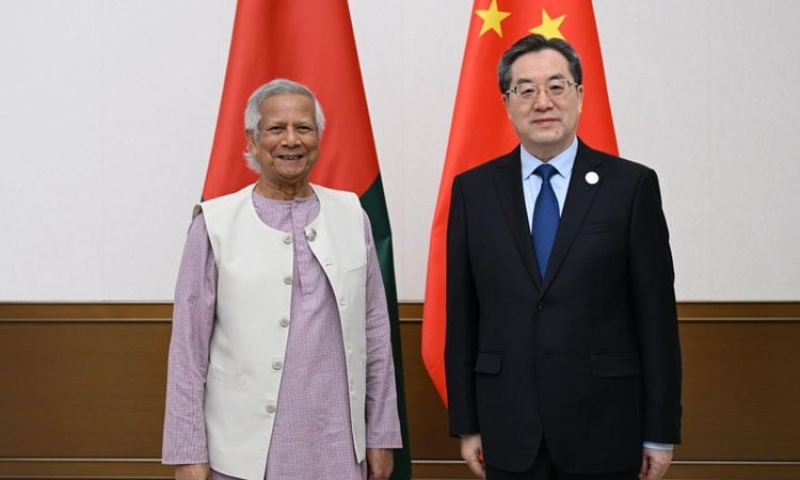- Israel Strikes Tehran with US Support Amid Nuclear Tensions |
- India Sees 9% Drop in Foreign Tourists as Bangladesh Visits Plunge |
- Dhaka Urges Restraint in Pakistan-Afghan War |
- Guterres Urges Action on Safe Migration Pact |
- OpenAI Raises $110B in Amazon-Led Funding |
China and Bangladesh Agree to Strengthen Bilateral Ties

China and Bangladesh have agreed to deepen their bilateral relations, extending full support to Bangladesh's Interim Government and enhancing cooperation in areas such as trade, investment, cultural exchange, and people-to-people connections. The two nations marked the 50th anniversary of their diplomatic ties with this renewed commitment.
Chinese Executive Vice-Premier Ding Xuexiang met with Bangladesh Chief Adviser Professor Muhammad Yunus on the sidelines of the Boao Forum for Asia Annual Conference in China. The two leaders also held a bilateral meeting to discuss further strengthening of their partnership.
"President Xi Jinping attaches great importance to your visit," Vice-Premier Ding said, expressing hope for Bangladesh's continued prosperity under Professor Yunus' leadership.
During the meeting, Professor Yunus reaffirmed Bangladesh's unwavering commitment to the One-China policy and highlighted the country's pride in being the first South Asian nation to join China’s Belt and Road Initiative.
Bangladesh requested Chinese support for various development and livelihood projects, including a reduction in interest rates for Chinese loans, from the current 3 percent to 1 or 2 percent. Dhaka also called for a waiver of commitment fees on Chinese-funded projects.
The Chief Adviser further requested China's assistance in relocating Chinese manufacturing industries to Bangladesh, particularly in sectors such as ready-made garments, electric vehicles, light machinery, high-tech electronics, chip manufacturing, and solar panel production.
Vice-Premier Ding responded positively, announcing that China would provide duty-free and quota-free access to Bangladeshi goods until 2028, which is two years after Bangladesh's transition from LDC to a middle-income economy. He also expressed China's intention to begin free trade negotiations with Bangladesh.
China also pledged funding for the modernization of Mongla Port and the Dasherkandi Sewage Project. Additionally, Beijing confirmed its commitment to importing mangoes from Bangladesh starting this summer, along with jackfruit, guava, and aquatic products, in an effort to address the significant trade imbalance between the two countries.
Vice-Premier Ding also announced that China would offer more scholarships to Bangladeshi students, building on the thousands already studying in Chinese universities. Furthermore, China pledged funding for the purchase of four ocean-going vessels for the Bangladesh Shipping Corporation.
On the regional front, Beijing expressed its willingness to facilitate dialogue between Bangladesh and Myanmar to help resolve the Rohingya crisis.
In response, Professor Yunus thanked China for its continued support, stating that the meeting marked a significant milestone in the growing Bangladesh-China partnership. "Let us work together to usher in a new era of friendship, cooperation, and collaboration, reinforcing the strategic ties between our two nations," he said.
The meeting was attended by key officials, including Foreign Adviser Touhid Hossain, Energy and Transport Adviser Fouzul Kabir Khan, High Representative to the Chief Adviser Dr. Khalilur Rahman, and BIDA Executive Chairman Ashiq Chowdhury.

